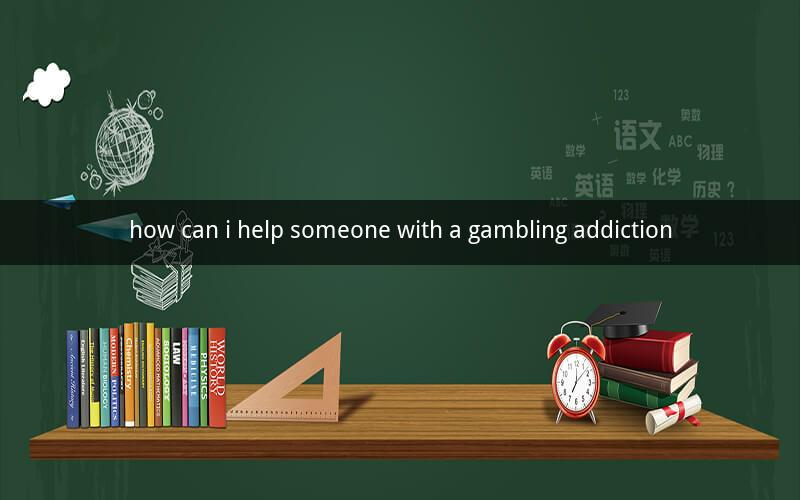
Table of Contents
1. Understanding Gambling Addiction
2. Recognizing the Signs of a Gambling Problem
3. Communicating with the Gambler
4. Encouraging Professional Help
5. Providing Emotional Support
6. Financial Management
7. Encouraging Healthy Alternatives
8. Dealing with Relapses
9. Supporting Family Members
10. Resources and Further Reading
1. Understanding Gambling Addiction
Gambling addiction, also known as compulsive gambling, is a serious condition that affects millions of people worldwide. It is characterized by an inability to control gambling behaviors, despite negative consequences. To help someone with a gambling addiction, it is crucial to understand the nature of the problem and its impact on the individual's life.
2. Recognizing the Signs of a Gambling Problem
Identifying the signs of a gambling problem is the first step in providing assistance. These signs may include:
- Secretive behavior
- Borrowing money or selling possessions
- Missing work or school
- Financial difficulties
- Increased stress and anxiety
- Relationship problems
3. Communicating with the Gambler
Open and honest communication is essential when dealing with someone who has a gambling addiction. It is important to:
- Express concern without judgment or criticism
- Avoid confrontational language
- Listen actively and without interruption
- Validate the person's feelings
4. Encouraging Professional Help
Seeking professional help is crucial for individuals with a gambling addiction. Treatment options may include:
- Therapy, such as cognitive-behavioral therapy (CBT)
- Support groups, such as Gamblers Anonymous
- Residential treatment programs
5. Providing Emotional Support
Emotional support is vital for individuals struggling with a gambling addiction. You can provide support by:
- Being a reliable source of encouragement
- Offering a listening ear
- Participating in activities that promote recovery
- Celebrating milestones
6. Financial Management
Financial management is an important aspect of helping someone with a gambling addiction. You can assist by:
- Monitoring the person's spending habits
- Setting up a budget
- Offering financial guidance
- Encouraging the person to seek financial counseling
7. Encouraging Healthy Alternatives
Encouraging healthy alternatives to gambling can help individuals with a gambling addiction find new interests and coping mechanisms. These alternatives may include:
- Exercise
- Creative hobbies
- Social activities
- Volunteering
8. Dealing with Relapses
Relapses are common in the recovery process. When a relapse occurs, it is important to:
- Remain supportive and understanding
- Encourage the person to seek help
- Refrain from judgment or criticism
- Reevaluate the support system
9. Supporting Family Members
Family members of individuals with a gambling addiction may also need support. Resources for family members include:
- Support groups, such as Gam-Anon
- Counseling services
- Educational workshops
10. Resources and Further Reading
For further information and support, consider the following resources:
- Gamblers Anonymous: https://www.gamblersanonymous.org/
- National Council on Problem Gambling: https://www.ncpgambling.org/
- GamCare: https://www.gamcare.org.uk/
Questions and Answers
1. Q: How can I tell if someone has a gambling addiction?
A: Look for signs such as secretive behavior, financial difficulties, and increased stress and anxiety.
2. Q: What should I do if I suspect someone has a gambling addiction?
A: Express your concerns without judgment, listen actively, and encourage them to seek professional help.
3. Q: How can I communicate with someone who has a gambling addiction?
A: Use open and honest communication, avoid confrontational language, and validate their feelings.
4. Q: What types of treatment are available for gambling addiction?
A: Treatment options include therapy, support groups, and residential treatment programs.
5. Q: How can I provide emotional support for someone with a gambling addiction?
A: Offer encouragement, be a reliable source of support, and participate in activities that promote recovery.
6. Q: What can I do to help someone manage their finances?
A: Monitor their spending habits, set up a budget, and offer financial guidance.
7. Q: How can I encourage healthy alternatives to gambling?
A: Suggest activities such as exercise, creative hobbies, and social events.
8. Q: What should I do if someone with a gambling addiction relapses?
A: Remain supportive, encourage them to seek help, and reevaluate the support system.
9. Q: How can I support family members affected by a gambling addiction?
A: Encourage them to seek support from family support groups, counseling services, and educational workshops.
10. Q: Where can I find more information and resources on gambling addiction?
A: Visit Gamblers Anonymous, the National Council on Problem Gambling, and GamCare for more information and support.